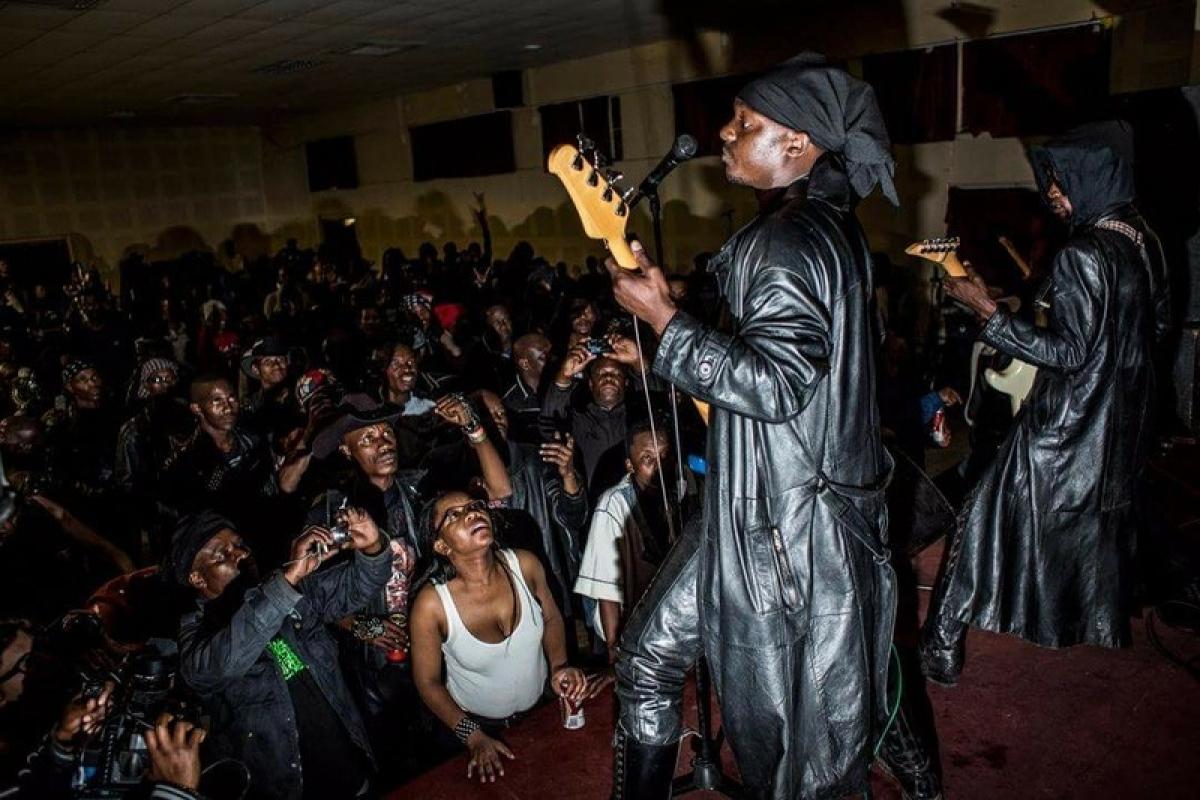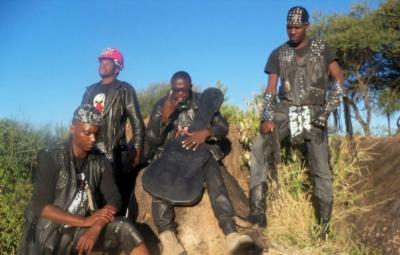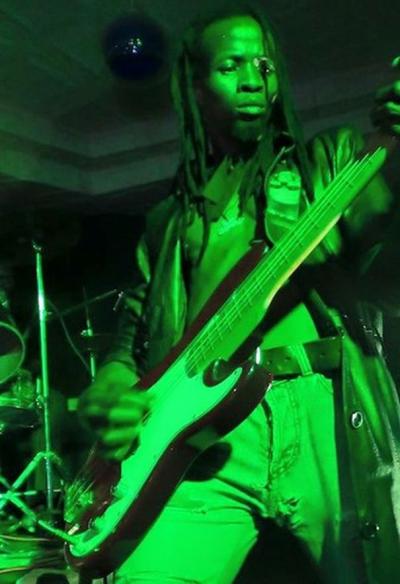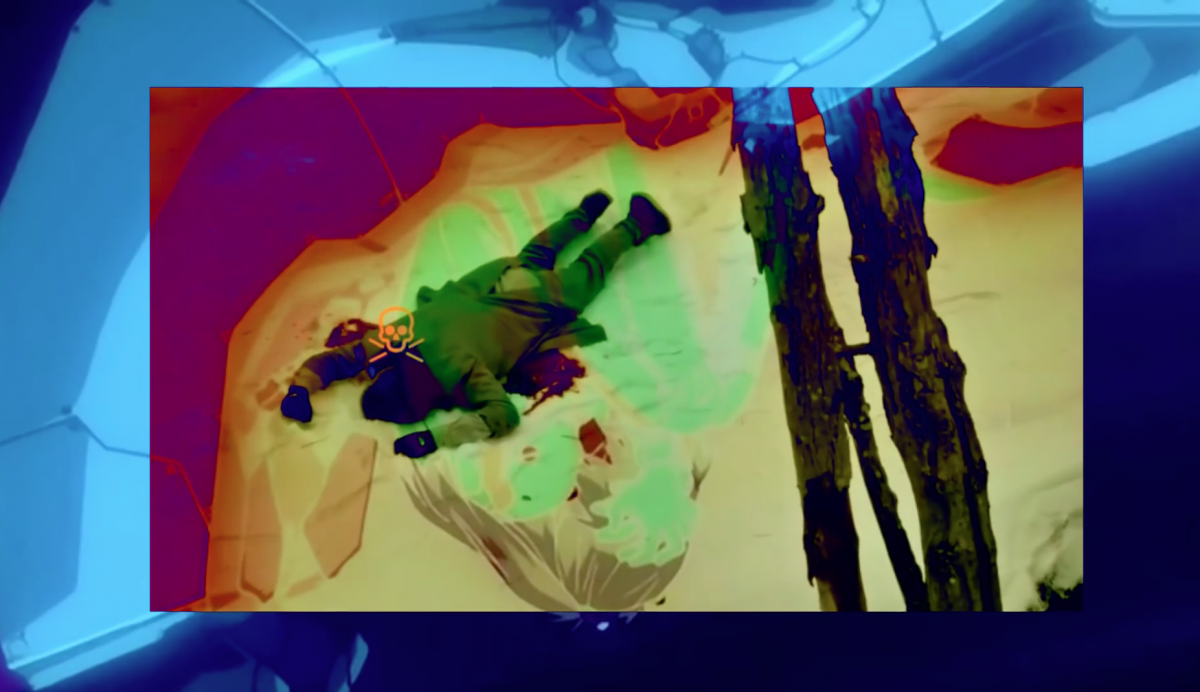
«Death Metal Takes All My Fears»
The death metal band Overthrust from Botswana is a central part of Africas lively metal scene. Their singer Tshomarelo Mosaka about the local scene, breaking taboos and the cathartic effect of listening to metal as watching a horror movie.
Let’s start with an introspective into metal music from Africa which is rather rare. Yet the scenes are growing. A band like Overthrust, coming from Botswana, might draw some more eyes to the potential of extreme metal in a highly phantasmagoric region. Come again? Yes, it can be surmised that a majority of European music listeners might associate a guitar-based band from there with a certain sound and set of features. What sort of guitar-driven music do we expect from Africa? Do these bands still possess a certain touch of exotic peculiarity?
Some journalists might remember Joseph Conrad’s odyssey into the heart of darkness, others might reanimate Livingstone who travelled on the upper Zambezi river and through Bechuanaland which is today known as Botswana. The British-Polish writer Conrad raises questions about imperialism and racism and some might have read his novel Heart of Darkness as an aesthetic approach to the beast in man, the thin line between so-called civilised and so-called savage people. His language is very dense. Livingstone was an explorer in Africa and is today mostly being remembered as having been rescued by Henry Morton Stanley, an adventurer who seems to be an ambivalent person, to say the least. These three men show three different ways of dealing with the continent.
Approaching this country, we bring along our own patterns. The discoveries belong to a colonial scheme and there is the question how a music journalist can become politically conscious enough not to fall again in colonial discourse. How often do metal journalists talk about conquering new territories? Even more the band members do so. It is an unserious talk, connected to the attitude of being warriors in a cultural battle. Or it is just image to impress the rest of their cultural niche. However, considering the hardships of getting popular as a band if you happen to be based in an unknown country, this talk gets silly soon. So now it’s really time to get started.
We’re still dreaming of a continent with thousand stories. So to dive into the river of oral history, we might address our thirsty questions to Tshomarelo Mosaka aka Vulture Thrust, being the Overthrust front man, bassist and lead vocalist and one of the founders of the band, together with Shalton Monnawadikgang aka Spencer Thrust, Gakeitse Botlhalentwa aka Suicide Torment and ex-member Balang Folai aka Bist. It´s a 5-piece old-school death metal band originating from Ghanzi, Botswana.

[Dominik Irtenkauf]: When did you start your band?
[Tshomarelo Mosaka aka Vulture Thrust]: We started in November 2008 when I was attending a Karate tournament at Botswana Police College where I met Spencer who was by then learning some advanced guitar skills and I was practicing my bass and growling vocal skills as well. I came with my guitar and dressed in rock attire and my sensei took me to Spencer’s place in the evening after training. He introduced us to each other and we talked about metal and our experiences, so the next day I and Spencer met and we started jamming together, we exchanged our composition and he was playing guitar and I was doing bass and growling vocals and everything was just going well, so we decided to start a band together and I told him about Suicide and Bist back in Gantsi.
[DI]: What made you start the band?
[TM]: I grew up in a cowboy and rock n roll family, my father was a cowboy and also a biker, he used to ride horses and spend some of his time at the cattle post while off duty from work and rode bikes while he was in South Africa where he was working as an artisan at Anglo-Gold Mine, «May his Soul Rest In Peace». My uncles were hard-core metalheads and I spent most of the time with them listening to metal, bands like Iron Maiden, Motörhead, Deicide, Broken Hope, Obituary, Cannibal Corpse, Immolation, Death, Saxon and many more metal bands and that was around 1996 when I was about 13 to 14 years and doing standard 6 in a primary school.
That is when I got influenced and inspired, I wanted to be like them, I wanted to be metal, I wanted to dress like a hard-core metalhead, I had pictures of different metal stars and I liked the way Lemmy of Motörhead dressed, I started studying bands lyrics, then in 2001 I started getting interested in death metal vocals, they were kind of a magic to me. I loved that maximum aggression in the power of growling vocals, I wanted to sing like that, I’d sing along the tracks of Morbid Angel, Immolation, Deicide and Cannibal Corpse, I was now so addicted that I’d watch dogs bark or see a lion roaring in a television and try to imitate them as I practiced my growling vocals.
In 2004 to 2005 at a Senior school, I started learning to write death metal lyrics and elements of death metal, in 2007 I enrolled at Police Academy so I can earn a salary and finance my metal desires, in 2008 I met my cousin Spencer Thrust who was a lead guitarist and together we agreed to start metal band, together with ex-drum member Balatedi and Suicide our current drummer. I had a motorcycle and I sold it in 2011 to buy basic rehearsal equipment and that’s how the band started. We wanted to take out what we felt inside to the world out there. We were hungry for metal. Stux Daemon of Wrust was my friend and he was always advising me and giving me lessons on death metal music and supporting me in any way he could, he even gave us a guitar when we started and recorded for us a single album («Freedom In The Dark») in April 2011. He is the man who really contributed positively to the growth of Overthrust.
[DI]: Can you tell us some details about the history of metal in your country?
[TM]: Our scene started around the 1990s, it was started by the band Noisey Road fronted by Ivo Sbrana whom we currently refer to as our Rock father, then Metal Orizon became the second metal band and Wrust as the first heaviest metal band and other bands followed including our band in 2008. By then, the scene was not as developed and popular as is becoming now and our big brothers did not give up but they were getting a good crowd because different music genres gathered in a big venue and played together their different music.
[DI]: The metal scene in Botswana is special. Would you like to elaborate on some of the characteristics?
[TM]: We are identical, that is to say we have a unique dress code, cowboy heavy metal attire (leather pants, jackets, cowboy boots and hats, bandanas, tight jeans, spikes, metal t-shirts and some of our friends go extreme and wore chains and skulls during the shows), we do parades, bike displays, walks, arm wrestling and we just keep it old school, we are so united like family and always there for each other and we are always super happy to welcome and interact and head bang, chill and drink beer and listen to metal with other metal heads from different places in the world. We love heavy metal and Rock music, we love anything that is metal, and we listen to every kind of metal.
[DI]: You gave an interview to BBC when Lemmy from Motörhead died. You mentioned him as a big influence; with Overthrust your music is more brutal but do you see parallels to Lemmy's music nevertheless?
[TM]: Yes, the attitude and Lemmy’s gear had an influence on our dress code, he was a man who could speak or say whatever he feels freely without any fear and he could express his anger and emphasize his point through his music and tell shit to the haters and even though we write and compose brutal music we employ the Lemmy Style of expressing our angry aggressive music without any fear and we tell it the way it is. If I want to tell a fake pastor he is an asshole and will die like any other sinner, I just say it directly. Listen to our track «Bogus Vicars».
[DI]: In this interview you also told that your mum was concerned about the music you play. You answered to the interviewer that you just had wanted to be a good son. So is the music still a rebellion against Botswana’s conditions?
[TM]: From that experience my mother and everyone else who has known me from childhood, give an example of me as the good that metal music can do to someone, and most of people in Botswana who are metalheads are so disciplined and peaceful people and the most ever smiling and happiest stress free. For example, I am a Police Officer by profession and people used to think that one can’t be an officer of the law when there are metal heads but ever since they discovered that I am a cop that changed their thinking and mind-set to the positive.
We have a huge support from Botswana people and our government and that makes it easy for us to develop our small scene. Death metal lyrics really fascinates me, you take death metal as it is, when I am listening to death metal it is like I am watching a horror movie, it really entertains me to watch or listen to something very underground and unique. In my years of listening to death metal I’ve realised that death metal explores and talks about the dark world, horrific scenes and underground situations that an ordinary person is afraid to talk about but how can we fear to talk about things we live with, we live with death and life, good and bad, dark and light, evil spirits and holy spirits but for many people it is a taboo to talk about evil, dark and death.
[DI]: What reasons led you to play in a death metal band?
[TM]: The power and aggression of death metal takes all my fears away from me, it toughens my mind and prepares me for harsh conditions of life, and it teaches me to believe in myself and work very hard to survive.

[DI]: In the 1990s, when death metal has grown big and commercial, bands in Scandinavia started to develop a new genre - black metal - to revolt against bands of which they thought, these bands would be too compromising. Did you hear some of these bands as well?
[TM]: Though am also a big fan of black metal, I didn’t hear anything about how black metal genre came into existence but I love it, I listen to bands like Behemoth, Mayhem, Gorgoroth, Ultha, Cradle of Filth, Catamenia etc.
[DI]: Did you ever think about the fact that most black metal bands aren't black by skin colour, or do you think this is too racist of a view?
[TM]: In metal there is no racism, we speak the same language and that’s «metal» and as metalheads we know «black metal», we mean an underground dark lyrical and religion criticising genre..ha..ha..ha..and that’s why I like black metal, it makes sense to me.
[DI]: In a book titled From Understanding to Action: Sustainable Urban Development in Medium-Sized Cities in Africa and Latin America, I read the following information: «Today, black Africa's part in global trade as well as in industrial production is negligible (Le Monde Diplomatique 2003), its access to global markets is restricted, and its terms of trade are worsening (UNCTAD 2003). Net income from trade is very often used to service the debt payment, constraining investment and development». (p. 10) Do you think this applies to heavy music in Botswana as well?
[TM]: Nope. Heavy music in Botswana is independently developing well due to our love of the music and the support from Batswana (people) and Botswana government.
[DI]: As a metal band in Botswana, is it easier to get known when you play a global sound such as US death metal or do you think that a band from Africa should integrate local sounds as well?
[TM]: People have different tastes and is always best to create the music that you feel and be original, be you not to want to be what others are and is even more good creativity when you integrate local sounds as well and that way as a Botswana band like Overthrust it will be not that easy but it will be just a matter of time to get popular. It is indeed true that it is a long way to the top if you want to rock n roll.
[DI]: Can you tell me if foreign bands played concerts in Botswana?
[TM]: Yes, most bands that come, are mainly from South Africa and last year in our show we had a black metal band from Finland by the name Kirrotuaani. People here in Botswana are always very happy when we host a foreign band and foreign bands are highly welcome in Botswana. Botswana is a very peaceful, welcoming and nice country, you should come here one day and experience the life in Botswana.
[DI]: I understand, that Botswana’s metal scene is connected to the ones in Namibia and the Republic of South Africa as well. Do you think that this helped to grow the scene in Botswana?
[TM]: Yes it did very well, we have played shows in South Africa and vice-versa and Namibian bands has come to play show with us in Botswana and we have exchanged and learnt a lot of stuff from each other. We interact very well and have always supported each other over the years.
Check the bands Facebook, YouTube and Soundcloud account.
Biography
Published on August 09, 2016
Last updated on June 18, 2019
Topics
From Beyoncés colonial stagings in mainstream pop to the ethical problems of Western people «documenting» non-Western cultures.
From Bangladeshi electronica to global «black midi» micro scenes.
From Self-Orientalism in Arab music to the sheer exploitation of Brazilian funk music by acclaimed artists: how exotica examine aesthetics playing with the other and cultural misunderstandings.
From world known reggae musicians fighting against the devil to the black metal scene in Indonesia.
